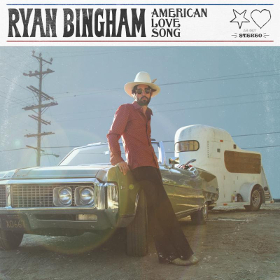Ryan Bingham- American Love Song (Album Review)

By Michael Momper
Ryan Bingham is a raspy-voiced New Mexico native who has consistently been one of my favorite staples of the alt-country or Texas Red Dirt country music scenes for many years now. His songs are honest reflections of the outlaw and rambler lifestyle, and with his raw guitar playing and soulful vocals his songs seem to perfectly encapsulate the dusty West and the plains of this great nation. 2015's Fear and Saturday Night was an excellent addition to his catalog, as it brought us some Dylan-esque harmonica/acoustic ballads, fuzzy rockers like "Top Shelf Drug", and foot-stomping sing-alongs like "Island in the Sky". His newest album is American Love Song, and it is most likely my most-anticipated album of the year.
Coming in at over an hour of music, this latest addition to the Bingham canon is a long journey, full of a good variety of musical styles that have Bingham in places outside of his comfort zone (check out the extreme vulnerability in "Lover Girl" or the strained vocals and candid reflection of "What Would I've Become") while also staying true to the rootsy music that has made me and many others such big fans. He knows his strengths and seems to develop them even further as he evolves.
One of the things I love about this album is the extremely palpable blues influence. There are plenty of dirty, pulsating blues rockers throughout this album, the best of which include "Hot House" and "Nothing Holds Me Down", and there are even tinges of delta blues in "Beautiful and Kind" and "Got Damn Blues". Bingham's voice and guitar playing are absolutely perfect for these styles, and it was extremely satisfying to see him explore this side of him further on American Love Song. Along with the rootsy blues influence there is a rocking and rolling side to the album that is very reminiscent of the Rolling Stones, and Bingham brings all the swagger and energy necessary to make songs like "Pontiac" and "Jingle and Go" some of the best head-bobbers in his entire catalogue. Like the Stones at their best, this album includes a lot of tasteful choir additions that give the instrumental lineup a much more lush depth.
This album delivers a lot of raw emotion and vulnerability, especially along themes of being alone in a long journey and being stuck at difficult crossroads. My main complaint about the album is its occasionally tactless political commentary. I have no problem with artists voicing their political opinions, especially in nuanced ways with tender care for their artistic vision. Woody Guthrie and Bob Dylan are pristine examples of this kind of affecting devotion to justice and truth that doesn't show blunted animosity or ideological possession that undermines the power of the music. George Orwell's classic novel 1984 is another example of a tactful but beautiful artistic rebellion to unsavory political tactics. On American Love Song, however, there are two less pleasing statements on the US political atmosphere that kind of left a bad taste in my mouth. I find it very unattractive when an artist of any political persuasion writes from a point of hatred or demagoguery- slinging names at people, even those you don't like (words like "racist", "bigot", "libtard" to name a few) is the basest and ugliest form of argumentation, a fallacy known as ad hominem. It's a shame to see someone as seemingly honest as Bingham engage in this because it is a disingenuous look at quite complex situations. American Aquarium, one of my other favorite alt-country outfits, seems to be of the same political persuasion as Bingham but chose to write "The World is on Fire" with a positive spin on their disillusionment, a hand reaching out rather than a pointing finger.
Listen to Bob Dylan's "Only a Pawn in Their Game". It is a scathing indictment of real White Supremacists, reminding listeners that the white man that killed Medgar Evers was "only a pawn" for the use of the Ku Klux Klan. In a somewhat forgiving twist, Dylan points out the evil treatment of this confused and poor white man, as well as the obvious malicious treatment of the blacks in the American South. It is a nuanced and poignant point of view, slightly more nuanced than the following lyrics found in Bingham's "Situation Station":
The president sh*ts upon the nation, and wipes his ass with every denomination".
Not only is this type of lyricism ugly and polarizing, it is also kind of gross. I'm not really digging the imagery of a 70+ year-old man relieving himself.
Overall, I can look past the ham-fisted political commentary for the splendor of the rest of the album, in large part due to the fact that this album has so many styles to offer and an extended run time. The blues influence was extremely welcome, and there are even a few Springsteen or Mellencamp-style stadium rockers like "Blue" and the aforementioned "What Would I've Become". For the most part this offering was worth the wait, in large part due to the energy that runs throughout; his passion for the craft hasn't faded a bit, as he is also starting a country music festival this year. I am curious to see if the political commentary trend continues in the alt-country scene throughout the year, and hope it doesn't lead to the development of a Hollywood-style echo chamber that alienates most of its listeners.
Rating: 80/100



Comments
Post a Comment